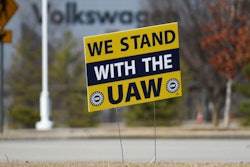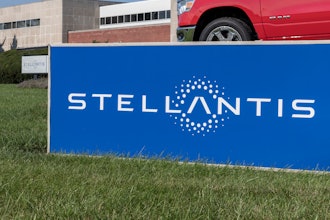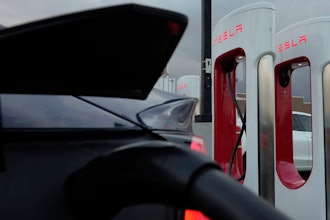MILWAUKEE (AP) -- Train advocates and workers at a Milwaukee train maker went on the offensive Wednesday, saying the state's plan to refuse federal funding for a high-speed rail line could cost jobs and hurt the state's economy.
Three workers from Talgo Inc. said they thought they had found secure, long-term jobs when the train maker hired them in the past year.
"Now everything's kind of up in the air," said Salomon Rodriguez, a Talgo supervisor, at a news conference. "I can't say for sure what's going to happen."
Rodriguez is one of about 25 employees currently at the Talgo plant in Milwaukee. The company, whose U.S. headquarters are in Seattle, has said it plans to have 40 workers here by the end of the month but its long-term plans to hire a total of 125 people are on hold.
That's because Republican Gov.-elect Scott Walker has said he wants to scuttle the high-speed rail project that would link Madison to Milwaukee. The federal stimulus bill allocated $810 million for the line but Walker has said he wants to use the money for other purposes or give it back.
"Gov.-elect Scott Walker is going to fulfill his campaign promise to stop the construction of the Madison-Milwaukee train line," Walker spokesman John Hiller said in a statement. "He will also fulfill his campaign promise to create an economic environment that allows the private-sector to create 250,000 new jobs."
The three Talgo workers are hoping Walker will reconsider. Joining the workers at the news conference was Mayor Ron Krueger of Watertown, a city where the proposed train would stop. He said it would be embarrassing if Wisconsin withdrew itself from a national rail system that promised to improve commerce, speed travel and reduce congestion.
"If we turn this down I think we will be the laughingstock of the nation," he said. "Those trains will find a way to connect Chicago and Minneapolis and unfortunately that route would not go through Wisconsin."
Illinois Gov. Pat Quinn said Wednesday he would be happy to find Talgo a new home in his state. In a not-so-subtle jab at his Wisconsin counterparts, the Democrat told company executives in a letter that Illinois' high-speed rail expansion has "overwhelming public support."
Quinn's administration "stands ready to do whatever it can to make Illinois your new Midwestern home," the governor wrote.
Talgo spokeswoman Nora Friend told The Associated Press she was grateful that Quinn reached out. If Wisconsin doesn't change its mind, she said, Talgo would remain in Milwaukee "no longer than spring 2012," when the company is scheduled to deliver two train sets to Oregon.
"If Wisconsin is losing enthusiasm for the rail program and other states are not, we will look to those states like Illinois that are supportive of extending the rail program," she said. "We appreciate the offer from Illinois. We want to go to a state that appreciates our industry."
Officials in Illinois and New York have both said they'd accept whatever federal money Wisconsin turns down for their own high-speed rail projects.
The Milwaukee news conference was organized by WISPIRG, a nonprofit public-policy organization. The group released a report Wednesday saying high-speed rail in Europe and Asia led to economic growth there and it could do the same here.
High-speed rail would cut down on the need for short flights, take cars off the roads and provide a reasonable alternative next time gas prices hit $4 per gallon, WISPIRG spokesman Bruce Speight said.
However, it's not clear the Wisconsin news conference would make a difference. Walker won last week's election in part by promising to end the rail project. If he were to reverse course he would be breaking a campaign promise before he was even sworn into office.
The speakers acknowledged that their pleas weren't likely to change anything.
"Truthfully it would be difficult," Krueger said. "But leadership depends on making difficult decisions at difficult times."
Three workers from Talgo Inc. said they thought they had found secure, long-term jobs when the train maker hired them in the past year.
"Now everything's kind of up in the air," said Salomon Rodriguez, a Talgo supervisor, at a news conference. "I can't say for sure what's going to happen."
Rodriguez is one of about 25 employees currently at the Talgo plant in Milwaukee. The company, whose U.S. headquarters are in Seattle, has said it plans to have 40 workers here by the end of the month but its long-term plans to hire a total of 125 people are on hold.
That's because Republican Gov.-elect Scott Walker has said he wants to scuttle the high-speed rail project that would link Madison to Milwaukee. The federal stimulus bill allocated $810 million for the line but Walker has said he wants to use the money for other purposes or give it back.
"Gov.-elect Scott Walker is going to fulfill his campaign promise to stop the construction of the Madison-Milwaukee train line," Walker spokesman John Hiller said in a statement. "He will also fulfill his campaign promise to create an economic environment that allows the private-sector to create 250,000 new jobs."
The three Talgo workers are hoping Walker will reconsider. Joining the workers at the news conference was Mayor Ron Krueger of Watertown, a city where the proposed train would stop. He said it would be embarrassing if Wisconsin withdrew itself from a national rail system that promised to improve commerce, speed travel and reduce congestion.
"If we turn this down I think we will be the laughingstock of the nation," he said. "Those trains will find a way to connect Chicago and Minneapolis and unfortunately that route would not go through Wisconsin."
Illinois Gov. Pat Quinn said Wednesday he would be happy to find Talgo a new home in his state. In a not-so-subtle jab at his Wisconsin counterparts, the Democrat told company executives in a letter that Illinois' high-speed rail expansion has "overwhelming public support."
Quinn's administration "stands ready to do whatever it can to make Illinois your new Midwestern home," the governor wrote.
Talgo spokeswoman Nora Friend told The Associated Press she was grateful that Quinn reached out. If Wisconsin doesn't change its mind, she said, Talgo would remain in Milwaukee "no longer than spring 2012," when the company is scheduled to deliver two train sets to Oregon.
"If Wisconsin is losing enthusiasm for the rail program and other states are not, we will look to those states like Illinois that are supportive of extending the rail program," she said. "We appreciate the offer from Illinois. We want to go to a state that appreciates our industry."
Officials in Illinois and New York have both said they'd accept whatever federal money Wisconsin turns down for their own high-speed rail projects.
The Milwaukee news conference was organized by WISPIRG, a nonprofit public-policy organization. The group released a report Wednesday saying high-speed rail in Europe and Asia led to economic growth there and it could do the same here.
High-speed rail would cut down on the need for short flights, take cars off the roads and provide a reasonable alternative next time gas prices hit $4 per gallon, WISPIRG spokesman Bruce Speight said.
However, it's not clear the Wisconsin news conference would make a difference. Walker won last week's election in part by promising to end the rail project. If he were to reverse course he would be breaking a campaign promise before he was even sworn into office.
The speakers acknowledged that their pleas weren't likely to change anything.
"Truthfully it would be difficult," Krueger said. "But leadership depends on making difficult decisions at difficult times."






















